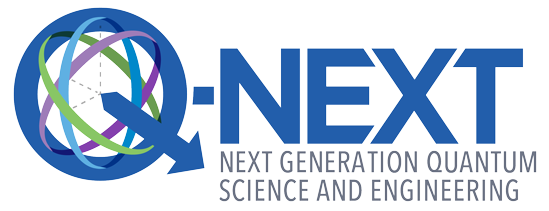In the News
-
The best qubits for quantum computing might just be atoms
From Quanta: Mark Saffman of the University of Wisconsin–Madison and Infleqtion is featured in this comprehensive overview of neutral-atom qubit research. Read More
-
How quantum computing could help us understand the universe
From PBS NewsHour: David Awschalom appears in this piece on the next generation of computing, one that will be far more sophisticated and dependent on understanding the subatomic nature of the universe. Read More
-
PME-led research into protein-based qubits earns $2.75M Moore Foundation grant
Bolstered by a new $2.75 million grant from the Gordon & Betty Moore Foundation, a team led by University of Chicago's Peter Maurer will soon study qubits made from protein. Read More
-
Infleqtion unveils 5-year quantum computing roadmap, advancing plans to commercialize quantum at scale
From Quantum Insider: Infleqtion shares a broad business update, including the first look at its new 5-year quantum computing roadmap. The roadmap's centerpiece is Sqorpius, the next phase of Infleqtion’s quantum computing program. Read More
-
Bringing quantum entanglement to the people
From the National Science Foundation: NSF’S Quantum Leap Challenge Institute Hybrid Quantum Architectures and Networks at the University of Illinois Urbana-Champaign, a Q-NEXT partner, has created a working demonstration that brings entanglement between photons to a public setting for the first time. Read More
-
New research unites quantum engineering and artificial intelligence
From the University of Chicago: University of Chicago’s Liang Jiang, Argonne’s Yuri Alexeev and team demonstrate how incorporating quantum computing into the classical machine learning process has the potential to bring greater sustainability and efficiency to machine learning. Read More
-
Choy will use an NSF CAREER award to create quantum-based navigation systems
From the University of Wisconsin–Madison: Q-NEXT collaborator Jennifer Choy of the University of Wisconsin–Madison is using her NSF CAREER award to develop quantum sensors that could supplement or supplant GPS. Read More
-
UChicago signs partnership at Davos to promote quantum science
From the University of Chicago: At Davos, Q-NEXT partner the University of Chicago, Seoul National University and the University of Tokyo agree to promote a global partnership in quantum information science and technology. Read More
-
Computational capabilities that will transform the world
From Forbes: Q-NEXT Director David Awschalom and the Chicago Quantum Exchange are mentioned in this article on world-transforming computational capabilities. CQE predicts that secure communication will be enabled via metropolitan-scale entangled quantum networks in the next five years. Read More
-
University, government, and industry researchers join forces to explore how quantum computing could aid financial institutions
From the Chicago Quantum Exchange: In a paper published in Nature Reviews Physics, a team of experts from Argonne National Laboratory, JPMorgan Chase, Fujitsu Research of America, Menten AI, the University of Chicago and the University of Delaware create a one-stop resource on the use of quantum computers to accelerate solutions for the finance sector. The paper discusses challenges in three categories at the intersection of finance and computing: optimization, machine learning and stochastic modeling. Read More
News and features
See all news and features-
Design rules and synthesis of quantum memory candidates
From the University of Illinois Urbana-Champaign: Researchers use density functional theory calculations to identify possible europium compounds to serve as a new quantum memory platform. They also synthesize one of the predicted compounds, a brand new, air-stable material that is a strong candidate for use… Read More
-
‘Ruler for light’ could enable detailed measurement in personal devices
Frequency combs have revolutionized precision measurement, but the bulky, power-hungry devices are limited to lab settings. A new efficient laser “microcomb” developed by Stanford researchers could bring that revolution to the handheld electronics realm. Read More
-
Resurrecting niobium for quantum science
For years, niobium was considered an underperformer when it came to superconducting qubits. Now scientists supported by Q-NEXT have found a way to engineer a high-performing niobium-based qubit and so take advantage of niobium’s superior qualities. Read More
-
Researchers from startups, government labs and academia develop new techniques for making qubits out of erbium
Argonne project addresses quantum technology challenges and highlight sthe versatility of a rare-earth metal used in lasers and to color glass. Read More
-
Meet Edward Schmitt, facilities engineer
Former Marine Corps electronics technician Edward Schmitt keeps the Argonne Quantum Foundry running while advocating for veterans. Read More
